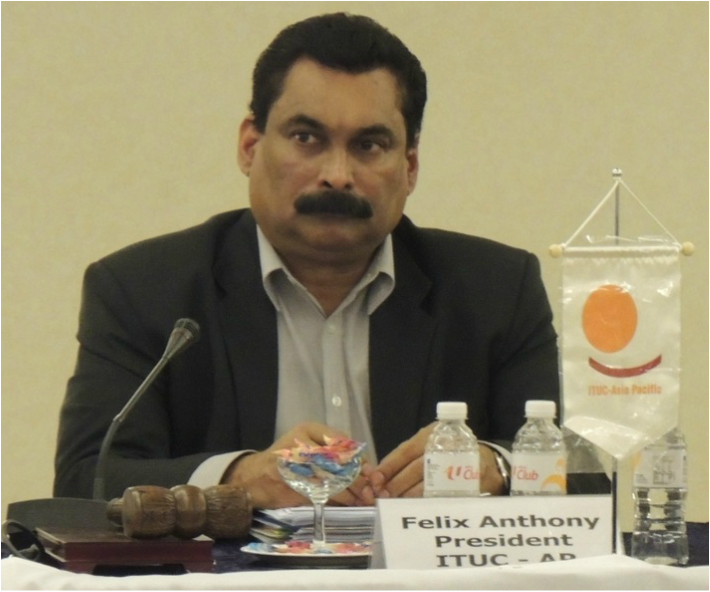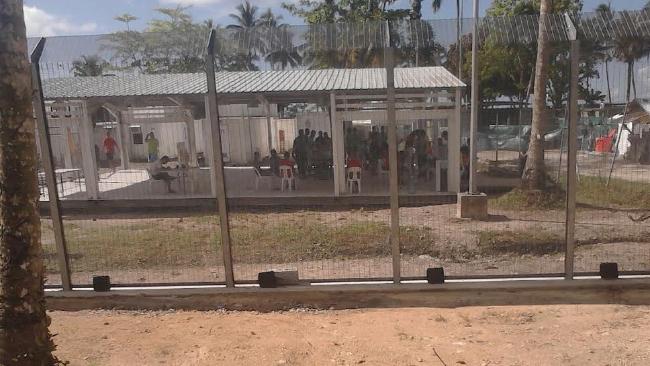The Tripartite Delegation's Report on Fiji will be presented to the March Session for a decision. The Fiji government through the Asia- Pacific group of governments attempted to delay a decision for a year - to November 2016. Australia, in an attempt to appease Fiji, proposed the amendment but did not receive the requisite support. Employers, EU and many other Governments supported the original resolution. Many governments were generally disappointed with Fiji's delaying tactics |
UN Human Rights Review in Geneva slams Australia’s asylum seeker and indigenous rights policies
Australia’s human rights record has been scrutinised by more than 100 countries at the UN, with the treatment of asylum seekers and Indigenous people drawing particular criticism.
Australia is being assessed before the universal periodic review, a quadrennial assessment of countries’ human rights record by the UN human rights council.
One hundred and ten countries spoke at Australia’s session in Geneva overnight, putting forward 300 recommendations for the country to improve its human rights record.
Because of the large number of countries who wanted to comment on Australia – more than half of the countries of the UN – each nation had only 65 seconds in which to address the broad issue of Australia’s human rights regime.
The issue of asylum seekers dominated concerns.
Indonesia – with whom relations have been strained over Australia’s asylum boat turnbacks – urged Australia to “ensure that the issues of refugees and asylum seekers are addressed in line with the principles of the Bali process and Australia’s other human rights obligations”.
India, a country to where Australia tried to return 157 Sri Lankan asylum seekers, said Australia should review its mandatory detention policies and ensure refugees were never sent back to places where they might face persecution.
And Turkey, which hosts nearly 2 million refugees, said Australia had to immediately cease transferring asylum seekers to third countries.
Britain welcomed Australia’s adoption of the recommendations of the Moss review into conditions on Nauru, while the US, noting Australia’s historical commitment to human rights, said it was concerned by the treatment of asylum seekers.
“We encourage Australia to ensure the humane treatment and respect of asylum seekers including those processed offshore in PNG and Nauru … [Australia should] closely monitor the processing of asylum seekers and refugees in offshore processing centres to ensure their human rights are respected.”
Even North Korea, a country with perhaps the most egregious human rights record on earth, criticised Australia: “We still have serious concerns at the continued reports of … violence against refugees and asylum seekers and violation of the human rights of Indigenous peoples in Australia.”
Australia sends, or is planning to send, asylum seekers and refugees to Nauru, Papua New Guinea, Cambodia and Kyrgyzstan. None of those countries spoke in Geneva.
Prof Sarah Joseph, director of the Castan centre for human rights law, said Australia’s treatment of asylum seekers had drawn the attention of nations from every region of the world. “Today, it was manifestly clear that we are not role models on issues of asylum, we are pariahs,” she said.
“The Australian delegation justified the policy on the same lines as the government: stopping drownings at sea, combating people smuggling and prioritising UNHCR refugees. However, there was little indication that the international community bought these excuses.”
Australian efforts to improve the rights of Indigenous people, in particular the proposal for a constitutional referendum on formal recognition, were praised by a number of countries.
But there were serious concerns raised about Indigenous health, education, housing and employment. Countries including Ireland, Norway, Denmark, Canada, Uruguay, Kenya and Paraguay flagged the overrepresentation of Indigenous Australians in the criminal justice system.
“While meaningful constitutional recognition is an important issue for Australia, the world recognises that we are closing the gap between Indigenous and non-Indigenous Australians far too slowly,” Joseph said.
The Australian delegation said it welcomed a “vigorous, wide-ranging, and balanced debate on human rights” and respected the advocacy of human rights defenders.
John Reid, first assistant secretary at the Attorney General’s Department, said Australia remained “committed to protecting human rights both at home and abroad” but conceded that challenges remained, including the gap in key life indicators between Indigenous and non-Indigenous Australians, and controlling irregular migration flows.
“Australia’s strong border protections measures have played a key role in enabling the government to maintain meaningful and significant humanitarian settlement and assistance programs,” he said.
“Such strong policies have also ensured public confidence in a well-managed migration program but, most importantly, Australia’s measures have saved lives at sea.”
Tamara Lions from Amnesty International Australia said Australia’s defence of its boat turnbacks policy – that it saved lives at sea – was “tragically untrue”.
“Amnesty’s recent report, Deadly Journeys, shows that boats of refugees are still making dangerous journeys in our region,” she said. “In May 2015, up to 8,000 people were estimated to have been stranded at sea. Over 1,100 people died in the Bay of Bengal and Andaman Sea between the start of 2014 and mid 2015.
“Australia misrepresents the problem when it says there have been no deaths – people are dying by the hundreds in seas in our region, just not in Australian waters.”
She added: “In the UPR session, many countries acknowledged Australia’s efforts in some areas such as the NDIS [national disability insurance scheme], but they then went on to raise a raft of concerns. The international community is clearly aware of Australia’s human rights failings and there is no doubt that this has affected our international reputation.
“Australia has a long way to go to mend its international reputation on refugees before it can be seriously considered for a seat on the 2018 human rights council.”
The Human Rights Law Centre’s director of advocacy and litigation, Anna Brown, said Australia’s efforts to demonstrate leadership on topics such as the death penalty and the rights of older people had been overshadowed by the wave of condemnation on policies of mandatory detention, offshore processing and boat turnbacks.
“Australia’s potential to be a human rights leader is being completely undercut by its tremendously harsh treatment of people seeking asylum,” she said. “Last night at the UN there were calls from nations in every region and political grouping in the world for Australia to change its policies.
“At a time when there is an unprecedented number of people around the world in need of safety, a wealthy democratic nation like Australia should be part of the solution but instead we are rightfully being condemned on the world stage for being part of the problem.”
She added: “The government’s generally constructive and positive approach to its review last night was undermined by its one-eyed and shallow justification for its treatment of people seeking asylum. Fronting a forum like this and just repeating a tired mantra wont fool anyone – it actually just damages our international credibility.”
But she welcomed the federal government’s “commitment to ending discrimination against lesbian, gay, bisexual, transgender and intersex people, which will ensure that many state laws, such as those governing adoption, will be improved over the coming months”.
The Australia director at Human Rights Watch, Elaine Pearson, said countries “from every corner of the globe” had pressed Australia to address discrimination against Indigenous people and to safeguard the rights of refugees and asylum seekers.
“A number of states called on Australia to end abuses related to offshore processing and pushbacks of boats, as well as mandatory detention of asylum seekers,” she said. “Now it’s up to Australia to see if it will seriously commit to addressing these concerns.
“We hope this is not a repeat of last time round, where Australia accepted a good number of recommendations but failed to implement some of them, especially on rights of asylum seekers and refugees.”



